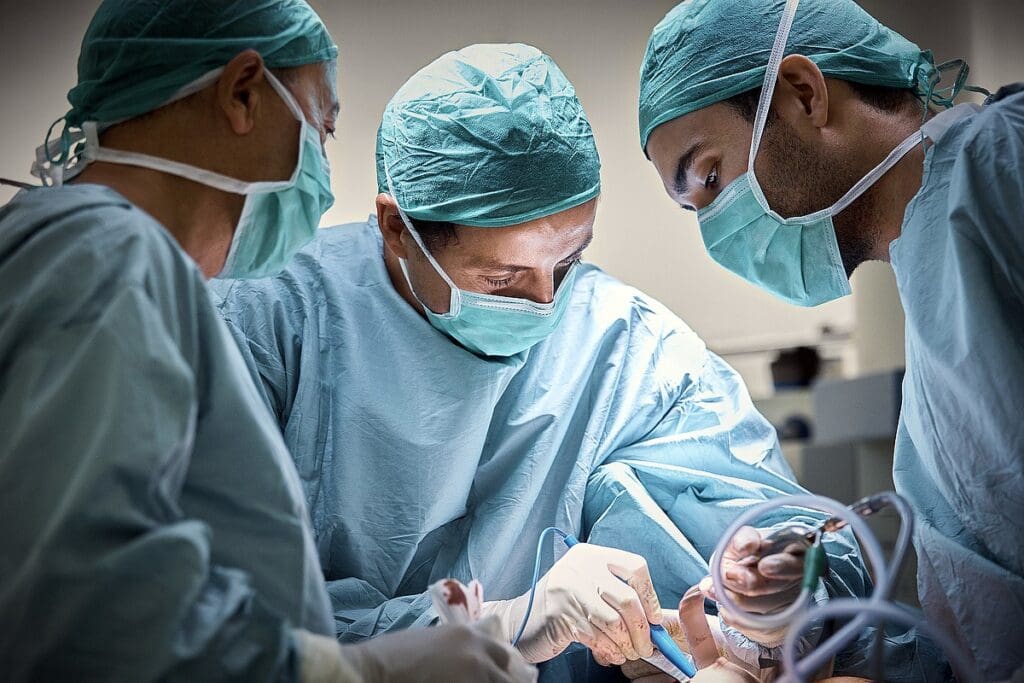Last Updated on November 24, 2025 by
Expectant parents often face tough decisions when their unborn child needs surgery. It’s key to know the roles of the specialists involved in such critical care.
Fetal surgery is a complex procedure done on an unborn baby to fix serious problems. Fetal surgeons are experts in these detailed operations. They work before birth to help improve the baby’s chances.

On the other hand, pediatric surgeons work on babies, kids, and teens after they’re born. They handle a variety of surgeries. Knowing the unique skills of these doctors is vital for families dealing with serious health issues.
Surgical care for kids is very detailed and needs a deep understanding of different specialties. Fetal surgeons and pediatric surgeons are at the core, each playing a key role at different times.
Pediatric surgery covers many areas, including fetal surgery. Fetal surgery programs show how teams work together to care for the youngest patients.
Fetal surgeons work on unborn babies, fixing serious problems before birth. Pediatric surgeons, on the other hand, treat kids after they’re born. They handle everything from birth defects to injuries.
Fetal and pediatric surgery has grown a lot over time. This growth comes from new medical tech, better surgery methods, and understanding more about kids’ health. Fetal surgery, in particular, has made huge strides, with better results for patients.
Key advancements include:
As we explore new possibilities in kids’ surgery, teamwork between fetal and pediatric surgeons is key. Their skills together mean kids get the best care, from before birth to childhood.

Fetal surgery programs show teamwork in today’s surgery. These teams, with surgeons and maternal-fetal medicine specialists, show the complexity and teamwork in pediatric surgery.
Fetal surgeons are true pioneers in a field that needs precision, skill, and compassion. They play a critical role in treating serious conditions in the fetus before birth.
Fetal surgeons get rigorous training for complex surgeries on the fetus. They go through advanced fellowship programs in fetal medicine and surgery. This training is essential for their expertise.
They learn not just surgical skills but also about fetal development and possible complications. Only a few surgeons each year become skilled in fetal surgery.
Fetal surgeons treat serious conditions like spina bifida and congenital diaphragmatic hernia. These conditions can greatly affect a child’s life if not treated. We focus on the latest treatments and interventions.
Fetal surgical procedures are rare. Only 29% of fetal center pediatric surgeons have performed a fetal surgery in the past year. This shows how specialized this field is.
Deciding on fetal surgery is a careful process. It involves a team of healthcare professionals. We make sure families understand the risks and benefits.
Pediatric surgeons play a key role in caring for children from birth. They are trained to handle a wide range of surgical needs in infants, kids, and teens.
Pediatric surgeons go through tough training and get certified. They complete a residency in pediatric surgery and get certified by a professional body.
Their training is strict, covering both theory and practical skills in pediatric surgery.
Pediatric surgeons treat many conditions, from birth defects to tumors and injuries. They also do thoracic surgery, treating chest cavity issues.
Pediatric surgeons care for kids with various needs. This shows their wide range of skills.
Postnatal care is vital for pediatric surgery. Many newborns need surgery soon after birth. This shows how important pediatric surgeons are in the early days.
64% of pediatric surgeons care for newborns. Parents often search for “pediatric surgeons near me” to find the right care for their child.
Fetal and pediatric surgery have their own unique settings and methods. Fetal surgery, for example, needs a team of experts and special tools. This is because it’s done on a fetus inside the womb.
Fetal surgery comes with its own set of challenges. It demands careful planning and a deep understanding of fetal development. Surgeons must also consider the risks to both the fetus and the mother.
Specialized training is key for surgeons doing in-utero surgeries. They need to handle the delicate nature of fetal surgery. This includes understanding the womb environment.
The setup for fetal surgery is different from pediatric surgery. Fetal surgery uses advanced imaging technologies and monitoring tools. These are needed to ensure the procedure’s success and safety.
For example, fetal surgery often relies on ultrasound and other imaging to guide the tools. This means the operating room needs to be set up differently than for pediatric surgery.
Risk assessment is vital in both fetal and pediatric surgery. But the risks are different. In fetal surgery, the risks affect both the fetus and the mother, making decisions more complex.
Decisions must balance the benefits against the risks. We consider the severity of the condition, the fetus’s age, and the mother’s health.

Multidisciplinary teams are key in both fetal and pediatric surgery. They ensure patients get the best care. The complex cases need a team effort, combining experts from different fields.
Fetal surgery centers often have pediatric surgeons on their teams. Data shows 96% of these centers include pediatric surgeons. This is important for full care, covering prenatal and postnatal needs.
Pediatric surgeons are vital, as they help with surgeries needed after birth. For example, a pediatric thoracic surgeon might be needed for a fetus with a congenital diaphragmatic hernia. This teamwork ensures the best treatment plan from start to finish.
Working with maternal-fetal medicine specialists is also key. Fetal surgeons team up with these experts to manage high-risk pregnancies. This partnership is vital for the best outcomes for both mother and fetus.
The care team changes as the fetus becomes a newborn. The prenatal team, including fetal surgeons and maternal-fetal medicine specialists, shifts to pediatric surgeons and neonatologists. A smooth transition is essential for the best care.
For families looking for general surgery near me or specialized pediatric care, knowing about this teamwork is reassuring. The involvement of pediatric surgeons in both stages shows the thoroughness.
It’s important to know how pediatric surgeons work to understand their role in kids’ health. They do many surgeries, from newborns to kids. They are key in both fetal surgery and post-birth care.
Only 29% of fetal surgery center surgeons do fetal surgery each year. This shows how rare and complex fetal surgery is. Fetal surgery needs a lot of training and experience.
Most surgeons in fetal centers do other important work, like counseling before birth and surgery after. This shows how team-based fetal care is.
64% of pediatric surgeons take care of newborns, showing their big role right after birth. Newborn care includes many things, like check-ups and surgery.
These surgeons are often the main doctors for newborns needing surgery. Their skills help newborns with birth defects.
Where surgeons work and the centers they are in shape their practice. Places like CHOP (Children’s Hospital of Philadelphia) are known for their pediatric surgery skills. This includes complex surgeries like thoracic surgery.
Centers like CHOP handle a lot of complex cases. This helps improve surgery techniques and results for kids. When looking for pediatric surgeons near me or a thoracic doctor near me, these centers are often recommended.
It’s key for expecting parents to know the difference between fetal and pediatric surgeons. Both are vital in giving top-notch medical care before and after birth. This ensures the best health outcomes for kids.
Fetal and pediatric surgeons get deep training for complex surgeries. Fetal surgery is about operating on the fetus before it’s born. Pediatric surgery covers a wide range of surgeries for kids.
Knowing the roles of these surgeons helps families make better choices. We’ve shown how important both fetal and pediatric surgery are. They offer top healthcare, improving kids’ health and happiness.
As we keep improving in pediatric and fetal surgery, our aim is to give the best care to families everywhere.
Fetal surgeons do surgeries on the fetus before it’s born. Pediatric surgeons work on babies, kids, and teens after they’re born.
Fetal surgeons get a lot of training. They learn to do complex surgeries on the fetus before birth. This training takes extra years beyond general surgery.
Fetal surgery is for serious conditions that need fixing before birth. This includes some birth defects or problems.
Yes, many pediatric surgeons take care of newborns. About 64% of them work with newborns.
Pediatric surgeons play a big role in fetal surgery centers. In fact, 96% of these centers have them on their team. This shows how they work together for the best care.
Pediatric surgeons and fetal surgeons team up, often in fetal surgery centers. They make sure care goes smoothly from before birth to after. This way, they give kids the best care possible.
Pediatric surgeons fix many problems. They treat birth defects, tumors, and injuries in young patients.
Some pediatric surgeons can do fetal surgery. But not all of them. Only 29% of fetal center surgeons do this work.
Look online for pediatric or fetal surgeons near you. Or, ask your doctor for a referral. They might suggest a pediatric general surgeon or thoracic surgeon.
Places like CHOP Specialty Care & Surgery Center, Voorhees offer top-notch care. They have full support for international patients. This ensures kids get the best care available.
Subscribe to our e-newsletter to stay informed about the latest innovations in the world of health and exclusive offers!